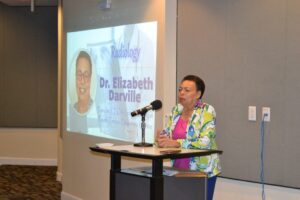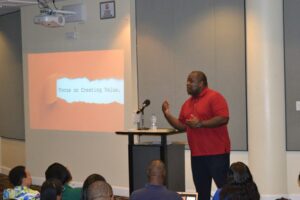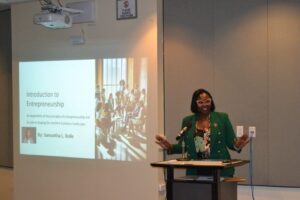Bahamas News
Bahamas Finance forecasts $832 million hit to tourism, in worst case scenario of COVID-19 impact
Published
4 years agoon
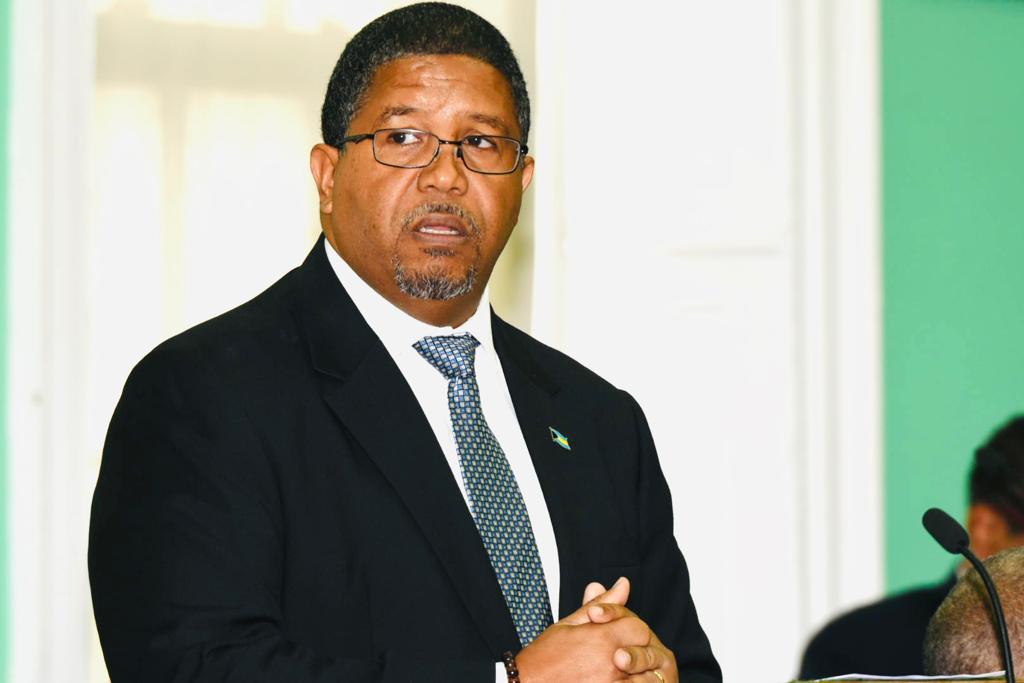
#March 18, 2020 — Full Statement by K. Peter Turnquest, Bahamas Deputy Prime Minister & Minister of Finance
INTRODUCTION
Mr. Speaker,
The Coronavirus (COVID-19) has now been declared a pandemic, and concerns continue to intensify as countries around the world take strict and drastic measures to contain its spread. As you know, The Bahamas has now recorded its first domestic case of the coronavirus, and it is likely that numbers will increase.
In response to the developing situation, the Government has implemented border control measures and travel restrictions from South Korea, China, Iran, Europe, the United Kingdom and Ireland. We have placed a ban on public gatherings and closed schools until April 14 to help limit the spread as much as possible and to prevent our public health system from becoming overwhelmed. The Government continues to emphasize the grave importance of heightened personal hygiene, and the need for social distancing, which simply means avoiding crowds, unnecessary social gatherings and close contact with others.
Mr. Speaker,
In the best of times, the Bahamian economy would not escape the effects of a global health crisis like this. However, we are still on the heels of Hurricane Dorian’s crushing impact, which not only increases our vulnerability, but heightens the anxiety felt by the Bahamian people. Economic growth in the short term will be negatively affected by global and domestic developments, and an overall contraction in domestic short-term economic growth is inevitable. Many people are understandably afraid, but I want to reassure Bahamian families that we will get through this challenge together, healthy, stable and strong.
When faced with crisis situations, such as the Coronavirus, good and open communication and collaboration with stakeholders are important building blocks to preparing an effective and well-considered response that delivers the best results for the public at large. I am indebted to industry representatives from the banking community – the Bahamas Chamber of Commerce, the Bahamas Institute of Chartered Accountants, and other respected Bahamian economists from the University of The Bahamas and elsewhere – who responded to my invitation to provide feedback on the Ministry’s initial economic modelling. They provided insightful recommendations on the ways the Government could alleviate the concerns of Bahamians impacted by the virus.
I am also grateful to the Shadow Minister of Finance, Mr. Chester Cooper, for graciously taking the time to meet with the Ministry of Finance and for the input he provided to our toolkit of possible actions. Several of his recommendations have been incorporated.
PRIORITIES FOR GOVERNMENT RESPONSE
Mr. Speaker,
These are uncertain and unprecedented times for sure. Nonetheless I encourage Bahamians not to panic or despair. This is a challenge that we can and will overcome together by being disciplined in our individual actions and decisive with our national response. I say this not as a wishful thought. The Government is acting decisively to contain the spread and the fallout effects. Most importantly, we are providing a safety net for people who are directly and indirectly impacted, and for the economy overall.
I will provide the specific details later in this statement; however, let me say up front that securing public health remains our paramount priority, so we are directing additional resources to bolster the public health care system. Lessening the economic burden imposed on individuals, families and businesses is also a top priority, so we are channeling additional allocations for social assistance support, and for temporary unemployment benefits for groups not typically eligible. Minimizing the need for layoffs and shoring up employment retention is a top priority, so we are also directing substantial financial assistance towards small businesses to support them in maintaining their operations. Whatever is takes, we will protect public safety, support the community and secure the welfare of our people.
EXTERNAL ENVIRONMENT & TRAVEL TRADE TRENDS
Mr. Speaker,
These measures are not only necessary from a pure public health perspective, but because the fiscal and economic fallout is real and tangible. No sector is more at risk than travel, and that industry has already taken a major hit. The travel industry is being hardest hit as companies restrict employee trips, airlines reduce flights, major events are postponed/cancelled and would-be vacationers choose to avoid foreign and domestic travel. Because of the issues with cruises, major cruise lines announced on March 13, 2020, a suspension in operations to and from US ports for 30 days. Workers are already facing reduced work weeks and unpaid leave, and businesses across the sectoral spectrum are facing the possibility of reductions in sales, which will impact their ability to maintain employment levels. This sets off a vicious set of consequential prospective impacts, with individuals not being able to afford basic necessities and meet their financial obligations.
All of these developments signal to us the huge exposure our economy faces from the spread of the virus. We earn the bulk of our foreign exchange from tourism, which accounts for an estimated 40% of our gross domestic product and just under 50% of direct employment. According to the Ministry of Tourism, preliminary data show a decline in stopovers of 12.5% for January and 26.5% for February, 2020 as capacity in Abaco and Grand Bahama remains largely constrained. Although cruise visitors increased by 11.3% in January, this was largely on account of a 77.9% gain in arrivals to the cruise lines’ private islands as such arrivals to Nassau/Paradise Island contracted by 20.4%.
ECONOMIC MODELLING TO ASSESS THE IMPACT
Mr. Speaker,
In keeping with our responsibility for sound governance, the Ministry of Finance undertook to model assumptions on the likely impact of the Coronavirus over the next four-month period to mid-July 2020. We ran three scenarios – low, medium and high impact – based on assumptions of varying degrees of losses for tourist arrivals over a four-month period. The projections produced by these scenarios are by no means precise and all-encompassing, as the fallout in tourism will have a cascading impact on a number of other sectors within the domestic economy. However, the outcomes for each scenario within this preliminary assessment will help us to adopt a reasonable and responsible approach to contingency planning.
While the total economic impact could be as low as $258 million over the next four months to June 2020, we are inclined to focus on the high impact scenario, which assumes 100% loss of cruise visitors and 80% of stopover visitors. In fact, recent developments in the industry would suggest a titling of the possible actual outcome to this extreme scenario, which could result in a total economic loss, including additional public sector spending requirements, of as much as $1 billion. Of this total, a dominant $832 million decline is projected for lost tourism related expenditure as a result of the reduced visitor count.
The direct hit on Government revenue is placed at an aggregated $108 million—$48 million for direct border taxes paid by visitors, and a total of $60 million for potential VAT and imports duty losses. The expenditure requirements could reach $49 million, of which we are funding $10 million from dormant account fund. These resources would be used to address the health and social requirements arising from potential cases of the virus and dislocations associated with job losses and the need to support small businesses.
Mr. Speaker,
To provide more context regarding our assessment, the economic impact of the coronavirus is rippling through the United States, our main trading partner, and across the world. Financial markets are adversely impacted as investor confidence is shaken and heightened concerns about disruptions in supply chains and interruptions in the conduct of business all suggest the possibility of a global recession, which will certainly have implications well into the upcoming fiscal year beginning in July 2020.
Mr. Speaker,
Persons are reasonably concerned about the impact of COVID-19 on the supply of goods coming into the country: Food, in particular. We recognize the risks posed by major disruptions in the supply chain as they can lead to critical shortages at a time when persons are already stressed. However, we must be mindful, because these risks can be exacerbated by panic buying and hoarding, which can fuel a perception that shortages exist.
I would like to be very clear: as the Prime Minister advised the country yesterday, the Government has been in touch with the major domestic importers and distributors of goods We get relevant updates on their supply operations through the National Coordinating Committee for COVID-19 that reports to the office of the Prime Minister. As of now, food importers and distributors advised that they have seen no major disruption in their supply chains and goods continue to come into the country uninterrupted. While new protocols have led to some delay in the shipment of goods, supply chains remain in good standing.
I wish to assure the public that we will continue to monitor this carefully, but there is no need to hoard large quantities of goods or be concerned about the prospect of shortages of necessary items.
The Government has strongly cautioned businesses against inflating prices. We are closing monitoring the retail sector to mitigate the practice of price gouging. We are also encouraging wholesalers and retailers to consider limits on the amount of essential supplies that one customer can buy to help guard against the hoarding of goods, and to ensure there is a stockpile of at least three months of essential items.
Mr. Speaker,
The projected contraction in tourism activity will inevitably have an adverse impact on The Bahamas’ foreign exchange reserves position, which stood at a healthy $2,030 million at mid-March 2020. Based on preliminary projections, external reserves could decline by some $900.0 million by end-2020. Under this scenario, the country would still have a manageable level of foreign reserves. However, the Central Bank will continue to monitor and judiciously manage the reserve holdings. The Ministry of Finance will support the measures that the Central Bank adopts to ensure that our foreign reserve holdings remain adequate for our ongoing financial and commercial needs.
POLICY MEASURES TO RESPOND TO COVID-19
Mr. Speaker,
The Government has adopted a package of policy measures to deal with the tremendous economic impact of COVID-19 that is already starting to be felt as hotel occupancies have fallen, as cruise ship arrivals are on a 30-day hiatus, and as hotel workers are being asked to take unpaid or vacation leave. These provisions have been put in place first and foremost to protect public health. They will also provide a safety net for individuals as we ride out this turmoil together.
- The Minister of Health will expound on the health-related efforts to detect, contain and prevent the spread of COVID-19. However, in addition to the nearly $5 million we have already earmarked for healthcare response, we are allocating up to an additional $11 million to cover detection, isolation, treatment and other COVID-19 mitigation activities.
- We are setting aside $4 million to provide food assistance and social support for displaced workers directly impacted by the virus, through the Ministry of Social Services. These food assistance vouchers, of $100 every second week will be targeted primarily to persons within the hospitality industry who are facing reduced work weeks. This allocation will allow for up to eight weeks of benefit payments but may be adjusted according to need
- The Government is allocating $10 million to provide for a temporary unemployment benefit, administered through the National Insurance Board, for self-employed persons working in the tourism industry. Self-employed persons, such as straw vendors, tour operators, Jet Ski operators, do not ordinarily qualify for the National Insurance unemployment benefit as part of their benefits package. However, the Government is making a special accommodation for those self-employed individuals in the tourism industry, given the unprecedented COVID-19 impact.
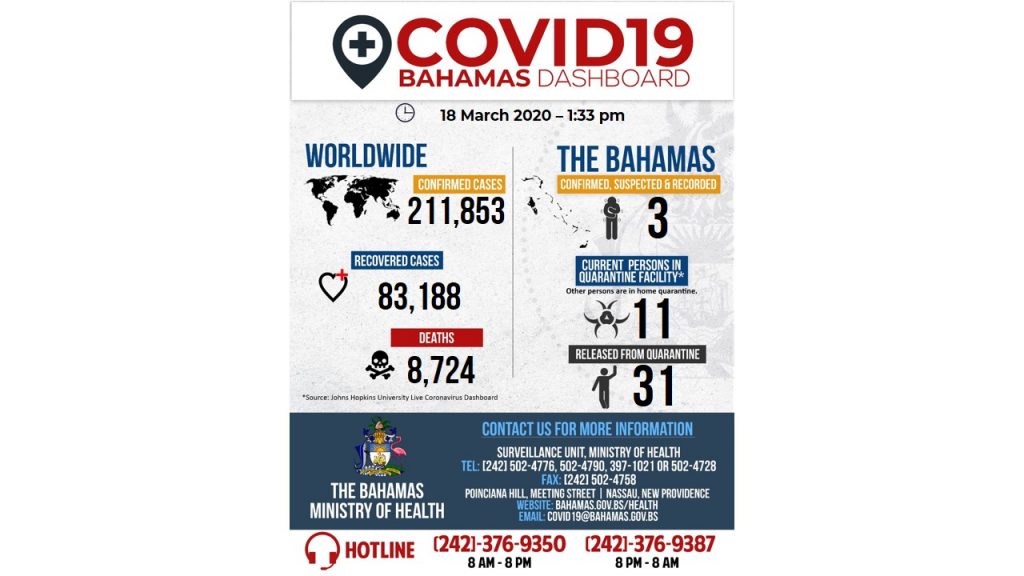
For persons in this category, the Government will offer a sponsored unemployment assistance of $200 per week, for up to eight weeks. To qualify, these self-employed persons must be currently registered with NIB or they must register at the time of application for this benefit. The time frame for this benefit may be adjusted according to need.
- Under the normal provisions of the NIB insurance scheme, individuals who contract COVID-19 or are quarantined because of exposure or suspected exposure will be eligible for sickness benefits. And, individuals who are temporarily laid off because of the economic impacts of COVID-19 will be eligible for unemployment benefits, up to the regular thirteen-week period, if necessary. NIB published information on this yesterday to remind persons of these benefits already available to them under the NIB programme. The government encourages all persons who are eligible to contact NIB.
- The Government has requested that Water and Sewerage reconnect all recently disconnected services for residential customers to ensure that personal hygiene is not compromised. Further, the government is also directing both Water & Sewerage and BPL to defer payment of bills – for an initial period of three months for residential customers who are diagnosed with the virus, who are in quarantine, or have been laid off. I must stress that this allowance is for this specific group of persons and that it is important that these impacted persons contact BPL and Water & Sewerage to register for this benefit and verify their situation as necessary.
- Ministry has included the Clearing Banks Association in our consultation on the proposed mitigating measures to address the current situation. The banks have reiterated to me their commitment to helping their clients through challenging times. They have advised that if persons are experiencing financial difficulties during this period, that they should contact their banks to understand the options that are available to them, such as payment deferrals, credit limit increases, or other measures to offer temporary relief. As this issue progresses, the banks have stated their intent to offer more tailored products and services to persons who financially are negatively impacted by the economic effects of COVID-19. The banks have however stressed that for now, it is important that clients who – because of their changing circumstances – find themselves in financial duress, that these customers should go in before they fall into arrears so that their specific situation can be assessed and addressed within the range of the banks’ available tools.
- Under the Accelerate the Youth Apprenticeship Programme, we will expand and accelerate training opportunities in the construction trade to support rebuilding efforts nationally.
- The Ministry of Works will reprioritize capital projects to increase the number of quickly deployable small-scale capital works to boost small business activity.
- The Government will accelerate the approvals process for all domestic and foreign capital investments projects currently in the pipeline.
- We will restrict all non-essential expenses including but not limited to travel, and the scale down or postponement of planned events.
FINANCING THE COVID-19 RESPONSE
Mr. Speaker,
We clearly recognize and accept that these measures are merely the phase one response to this situation. The Ministry is continuing to monitor the situation closely and is preparing for the medium- and longer-term plans that will need to accompany a future economic landscape – one that now looks vastly different than it did just four months ago. The Ministry will continue to adjust as circumstances change and will over time speak to the medium- and longer-term plans within the budget exercise and beyond.
As all Bahamians would be aware, the Government is up against substantial fiscal limitations, given its ongoing fiscal consolidation and the additional appropriations that were required for the equally pressing and urgent restoration activities in Grand Bahama and Abaco after Hurricane Dorian. Over the next four months, we expect the new fiscal demands associated with the COVID-19 to exert additional pressure on our anticipated deficit numbers, and we expect the impact will linger into the new fiscal year.
While the extent of the impact of the COVID-19 on the Bahamian economy is still unfolding, the plan is to first utilize our existing contingency reserves and to reprioritize expenditure to remain within the limits of the recently revised borrowing envelope for the current fiscal year. Should it become necessary, the Government could consider among its funding support options, accessing the International Monetary Fund’s non-conditional Rapid Credit Facility—with current eligibility placed at a maximum of $200 million. Simply put, we have no plans to request additional borrowings at this time, as we are diligently managing the country’s debt levels. We will update these projections based on our ongoing monitoring and reassessment of needs.
It is important, however, Mr. Speaker, that Members appreciate that even if the threat subsides over the next three to four months and tourism sector begins to rebound, it is likely that such a rebound will be slow and measured. Thus, it is important to highlight that our upcoming budget must be informed by a reality that the Government will likely need to continue to use fiscal measures to boost investment and consumption and mitigate against a contracting economy.
Accordingly, while we remained tethered to our commitment to fiscal and budgetary responsibility, we will revisit our fiscal targets within the context of the fiscal responsibility legislation, to determine the need for ongoing flexibility, so that the Government can adequately and responsibly respond to the emerging social, investment and other private support needs to minimize the negative impact on Bahamians and the broader economy.
CONCLUSION
Mr. Speaker,
Together, these measures represent our immediate and short-term push to ensure public safety and to support Bahamians as we navigate this global health crisis together. The Government is taking this situation very seriously and Bahamians should as well. That does not mean panicking or hording supplies. It means being disciplined and following public safety advice relating to personal hygiene and social distancing. It means taking advantage of the assistance programmes made available through employers and the Government, practicing personal budgeting and curtailing discretionary spending, where possible.
Ultimately, the pace of the eventual economic recovery will largely depend on global factors, including how quickly the United States, Europe and China are able to reverse the spread of COVID-19. However, the Government is confident that we have the wherewithal and access to the resources needed to get through this together.
As the situation remains fluid, we are continuing to assess the need for further fiscal and budgetary adjustments to refocus resources on the COVID-19 mitigation initiatives. As I would have mentioned earlier, we have had several consultations with private sector stakeholders to ensure that our national response evolves in an efficient and effective manner. We will also remain committed to ensuring the Bahamian public at large is aware of our response strategy and the measures that are available to them for economic relief.
Mr. Speaker,
As I conclude, I want to reflect on the fact that the COVID-19 pandemic is another sobering reminder of how interconnected we are as a global village. No country can wall itself off from the challenges we face in the 21st century. Whether it is the global climate crisis, global inequality or a pandemic, we have more than enough reminders to know that what others do affects us on our little islands, and what we do, similarly has an impact on the rest of the world. At home and across the world, this is a time for solidarity and unity. The demands of the 21st century require that we harness our collective imaginations and talents to support each other and to solve our common challenges.
There will be many lessons to learn form this episode, but I have no doubt that like Hurricane Dorian, it will serve to demonstrate our strength and resolve as Bahamian people to weather any storm. One of our enduring values will always to be our brother’s keepers, and as Bahamians face the hardships that may come from sickness, dislocations or loss of income, let them be comforted in knowing that they are not alone. Throughout the long history of the history of The Bahamas we have had trying times and hard times. We have endured the scarcities of global wars and the ravages of an untold number of hurricanes. Yet, our faith in our God and our commitment to each other has seen us through. And this remains the source of our resolve and our peace even in the midst of this emerging crisis.
The COVID-19 pandemic and its social and economic effects are a setback for sure; but we know that this too shall pass. Unlike with a hurricane or other natural disaster, our physical economic assets will not be compromised or destroyed. As the pandemic subsides, our beaches, our resorts, our home vacation rentals and the unique warmth and hospitality of the Bahamian people will be here, and they will be intact. They will welcome back thousands of tourists eager once again for sun, sand and sea. These visitors will in the coming months and years have a substantial number of new properties and new features across the country that will generate scores of jobs and entrepreneurial opportunities for Bahamians throughout the archipelago.
So, Mr. Speaker, Bahamians can rest assure that the government is doing and will continue to do what is necessary to weather this particular social and economic storm. And as we emerge as a country on the other side of this pandemic, we remain ever confident of a brighter and more prosperous tomorrow.
Thank you, Mr. Speaker.
Magnetic Media is a Telly Award winning multi-media company specializing in creating compelling and socially uplifting TV and Radio broadcast programming as a means for advertising and public relations exposure for its clients.

You may like
-


India Feed Mill to save The Bahamas $12.5 Million
-
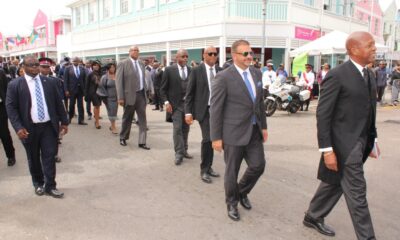

Bahamas Government to Introduce Measures to Address the High Cost of Living
-


Eleven Months, now NEW COVID death for TCI
-


Covid Entry Vaccine mandate ‘working’ for Turks and Caicos
-


Masks on for Students in TCI, Education extends face covering rule
-


Omicron, the Dominant Strain in TCI
Bahamas News
Career Symposium 2024 Connects University Students with Successful Professionals
Published
3 days agoon
April 16, 2024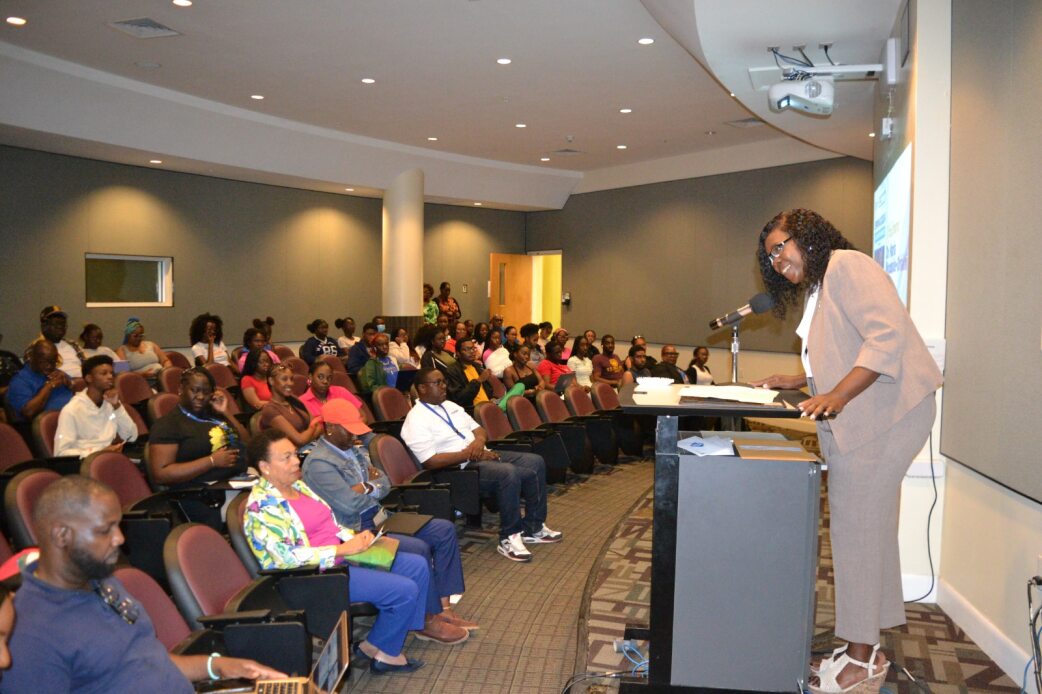
Nassau, THE BAHAMAS — Some of the most successful and accomplished professionals and business leaders in the country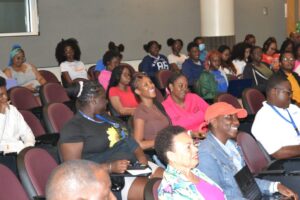 recently shared their experiences and nuggets of wisdom with students at University of The Bahamas (UB) about thriving in a wide range of careers.
recently shared their experiences and nuggets of wisdom with students at University of The Bahamas (UB) about thriving in a wide range of careers.
The University Centre for Counselling and Career Services and the Career and Job Placement Advisory Unit collaborated to host the 2024 Career Symposium which brought students face to face with leaders in the careers to which they aspire.
Vice President of Academic Affairs, Dr. Maria Oriakhi, said the symposium was key to developing potential as university students strive to leave their mark on the world.
“In the spirit of collaboration and growth, let us engage in meaningful dialogue, cultivate relationships, and harness the power of collective wisdom to shape our futures,” said Dr. Oriakhi. “Together, let us embark on this journey of exploration and discovery, united in our commitment to realizing our fullest potential and making meaningful contributions to our communities and beyond.”
Promoting careers in psychology, Ms. Curry noted that psychologists are equipped with the ability to help others, troubleshoot areas of weakness within themselves, and become better people and professionals in the process.
“The floor is yours to be able to explore. There’s no job where you don’t have to deal with people, so learning, even if you get a bachelor’s in psychology, is a great grounding,” she said.
Dr. Darville, one of few interventional radiologists in The Bahamas, offered another nugget of advice on choosing an area of study.
“It is important to know enough about yourself in order to make the decisions you want to make,” said Dr. Darville. “You have to work on yourself first and know what you want to do. Radiology gives you a chance to have fun. It gives you a chance to mold your career closer to your personal life than other medical specialties might.”
Another growing field is project management which Mr. Hepburn called a life skill. He also urged a commitment to lifelong learning.
“Individuals that continue to learn become unstoppable, period,” said Mr. Hepburn. “It is so true. When you learn, you become unstoppable because nothing can stop you in your process of development.
“The more you know, the more valuable you are. We need individuals who are cross functional—that can operate in different capacities. So please understand that your learning should never stop.”
With small and medium-sized businesses helping to drive the economy at an incredible rate, Ms. Rolle affirmed the importance of entrepreneurship in any economy.
“When we talk about entrepreneurship, we usually look at it from a myopic standpoint,” she said. Ms. Rolle. “What do I mean by that? Small, but usually about self: ‘how do I make more money?’ And in some cases, some look at entrepreneurship as a way of survival. ‘I need to make a couple extra dollars, I have this bill to pay’. Those types of things.
“But entrepreneurship really, in its truest form, is about innovation, whether it’s a new concept or any existing concept that you innovate new ways, or help expand the economy.”
The career symposium was held at the Harry C. Moore Library and Information Centre and is held every academic year.
PHOTO CAPTIONS
- Career Symposium 1: UB Vice President of Academic Affairs, Dr. Maria Oriakhi, delivers the opening address at the 2024 Career Symposium.
- Career Symposium 2: Students and guest speakers enjoy a lighthearted moment during the 2024 Career Symposium.
- Career Symposium 3: Ms. Rickell Curry speaks to students during the 2024 Career Symposium.
- Career Symposium 4: Dr. Elizabeth Darville delivers remarks during the 2024 Career Symposium.
- Career Symposium 5: Mr. Wellington Hepburn educates students on the importance of project management during the 2024 Career Symposium.
- Career Symposium 6: Ms. Samantha Rolle talks about the role and importance of entrepreneurs and entrepreneurship in any economy.
Office of University Relations
University of The Bahamas
2nd Floor, Michael H. Eldon Complex
Oakes Field Campus
P.O. Box N-4912
Nassau, The Bahamas
Tel: (242) 302-4355/4354/4365
Bahamas News
$36 Million Dollar Upgrade for World Athletics Relays in Nassau, Bahamas
Published
4 days agoon
April 15, 2024
Rashaed Esson
Staff Writer
#TheBahamas, April 15, 2024 – After years of thorough maintenance, The Thomas A Robinson National Stadium in The Bahamas is finally getting a multi-million dollar makeover, readying the 10-year old facility ahead of the World Athletics Relays on May 5, 2024; it is being staged in Nassau for the fourth time.
This $36 million refurbishment is being funded by the Chinese Government, as part of a vision to enhance the country’s sport infrastructure to benefit youths in athletics. The stadium was gifted to The Bahamas in 2012 by the Chinese.
The relay is the qualifying event for the 2024 Summer Olympic Games and there will be 32 national teams, in each relay event, and 20 races on both days of competition, according to World Athletics.
Day 1, will have 20 heats across the five Olympic-calibre events (4 heats each for 4×100, 4×400, men, women and mixed) and will qualify 40 teams for the Summer Olympics.
Distinctly, the top two teams from each heat will directly qualify for the 2024 Games.
On day 2, 30 more national teams will be qualified through 15 heats and five finals, across those five events.
The upgrades which include new trusses, rooftops, seats, the lawn, score boards, LED displays and more, are expected to be complete at least two weeks before the relays, being held under the theme: ‘Chase the Sun’.
In a special ceremony on Monday April 8, The Bahamas Prime Minister, Philip Davis said:
In December 2023, our shared vision took shape, as the government of the Commonwealth of The Bahamas, and the government of the People’s Republic of China, inked an implementation agreement for the renovation of the stadium. This gesture of goodwill and friendship, from the Chinese government to undertake the China Aid Maintenance and Renovation project of our national stadium, stands as a testament to the strong bonds that unite our countries. This project, executed by China Urban Construction Research Institute Company Limited, and the China Machinery Industry Construction Group Company Limited, reflects our shared commitment to excellence, innovation and mutual development.”
Additionally, H.E Dai Qingli, outgoing Chinese Ambassador to The Bahamas who also attended that ceremony, spoke.
“At the end of the project, the Bahamian people will get a fully renewed and modern world class stadium because everything is going to be either renewed or repaired,” she said.
Some 1,600 athletes will be in The Bahamas for the World Athletics relays, with five events. The Bahamas won the bid over Lausanne, Rome in 2022.
Mario Bowleg, Minister of Youth, Sports and Culture in reports, thanked China for their contribution to the redevelopment of the stadium.
“We thank them for their commitment to ensuring that they bring this facility back up to A1 standard so that we can continue holding international events and using these facilities as a development of our young people.”
Bahamas News
Bahamas Government and Grand Bahama Port Authority in $360 MILLION squabble
Published
4 days agoon
April 15, 2024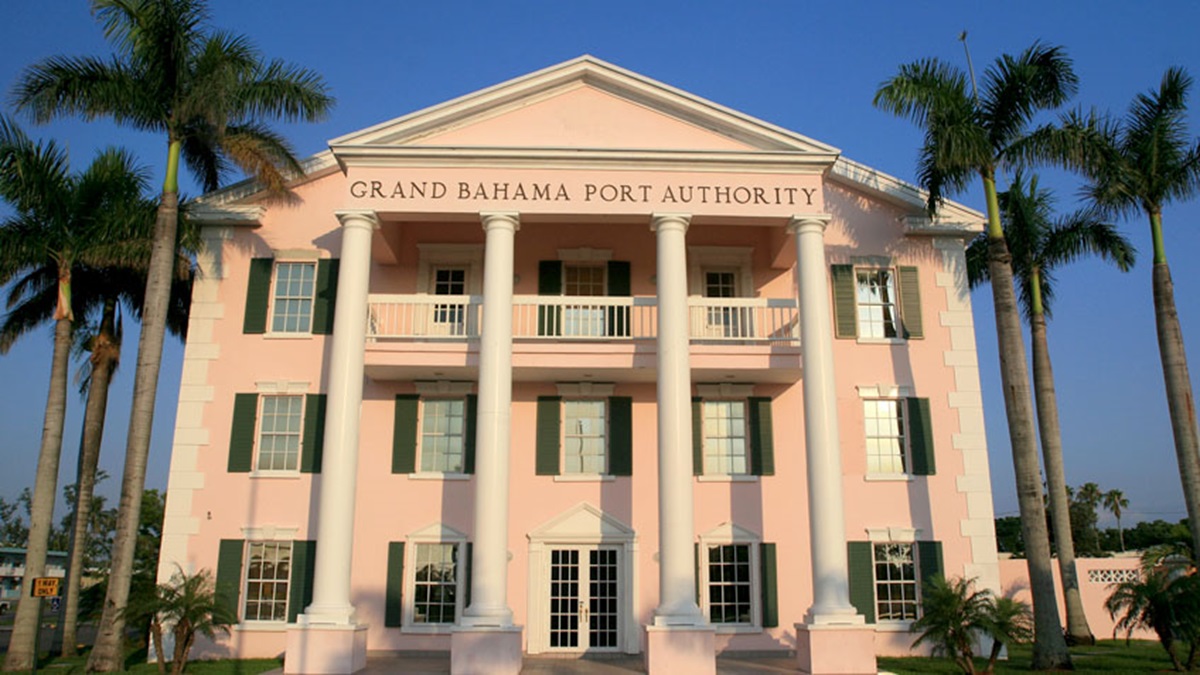
#TheBahamas, April 15, 2024 – The Bahamas Government says the Grand Bahama Port Authority owes over $300 million, now causing a very public squabble between the two entities and potential years long arbitration proceedings.
The total owed according to the government is $357 million over the last five fiscal years, 2018-2022.
Seemingly down to business, the Davis Administration, according to reports, sent a letter to the Port Authority at the start of the month, in which 30 days was given for them to pay up.
If the 30-day deadline isn’t met, Davis says the Government has the right to start arbitration proceedings.
A Grand Bahama attorney who criticized the government’s actions, also expressed that the tension could lead to up to five years of arbitration.
The letter, as reported by the Tribune, refers to clause 1(5)(c) of the Hawksbill Creek Agreement.
Regarding the tensions between the Port Authority and the Government, the financial conflict apparently rests on Davis’ accusation that the Port Authority failed to follow its obligations under the Hawksbill Creek Agreement.
“Unfortunately, the Port Authority has not been living up to its legal obligations to develop and grow the economy in Freeport. In many cases, the government has had to step in where the Port has failed. Let’s be clear about what this means: it means that the Bahamian people have been subsidizing the profits of these private shareholders! That is not right. You deserve flourishing, thriving communities. You deserve an inclusive economy that generates opportunity, dignity, and security. You deserve what is owed to you under the Hawksbill Creek Agreement,” Davis said.
In a clap back at the Government’s accusations, the Port Authority in reports are quoted declining the Government’s claim that they owe the “sum of $357 million.”
“We reject and will robustly defend against this claim, which we firmly believe will be defeated,” it stated.
Davis, who was speaking in a meeting on Saturday April 6, informed that before things got to this level, they were having meetings.
“We had many, many meetings and exchanges before we arrived at this point. But there were too many delays and too many dead ends. When only one side appears interested in advancement – and when the people of Freeport urgently need change and progress – then decisive action is the only choice,” he maintained.
The now peaked tension was sparked in June of 2023 when Davis stated that the Authority is failing to maintain Freeport’s infrastructure and encourage the growth of the city, as it claimed owed expenses, now said to be the hundreds of millions.
To this, in June 2023, the free quasi-governmental authority responded saying the sums stated by the government are “contested” and “it is yet to be satisfied,” claims reports say, are supported by credible evidence.
TRENDING
-

 News1 day ago
News1 day agoDR man rented Jet Ski nine days ago in Providenciales; where is he now?
-

 Health1 week ago
Health1 week agoTURKS AND CAICOS ISLANDS PARTICIPATED IN EIGHTH MEETING OF NATIONAL HIV/AIDS PROGRAMME MANAGERS AND PANCAP SHARE FAIR
-

 Caribbean News3 days ago
Caribbean News3 days agoCARICOM, UN applauds published decree establishing Haiti’s Transitional Government
-

 Caribbean News6 days ago
Caribbean News6 days agoHaiti Gang Firearms more than Police – UN says where they come from.
-

 Health1 week ago
Health1 week agoChildren and Teens Vaping, Royal TCI Police say “IT IS NOT SAFE!”
-

 Caribbean News6 days ago
Caribbean News6 days agoGuyana Wildfires
-

 Bahamas News4 days ago
Bahamas News4 days ago$36 Million Dollar Upgrade for World Athletics Relays in Nassau, Bahamas
-

 Caribbean News1 week ago
Caribbean News1 week agoYellow Fever Outbreak in Region and Beyond, Travellers Warned

